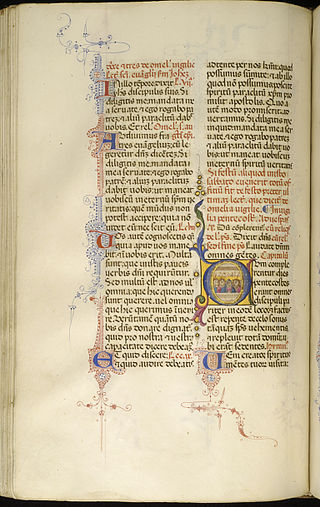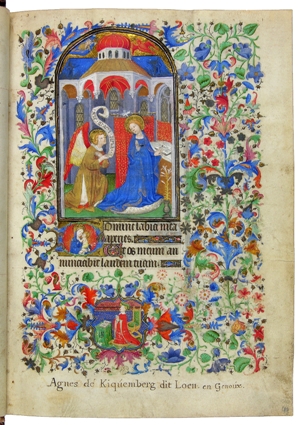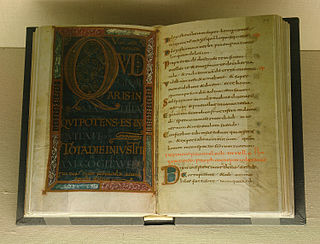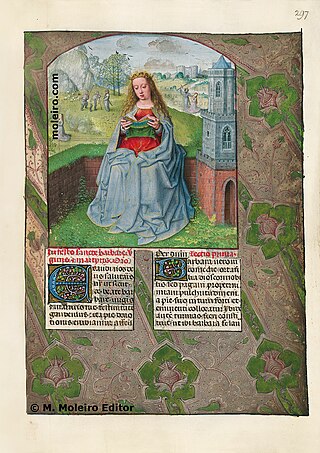The Benedictine Rite is the particular form of Mass and Liturgy celebrated by the Benedictine Order, as based on the writings of St. Benedict on the topic.
The Benedictine Rite is the particular form of Mass and Liturgy celebrated by the Benedictine Order, as based on the writings of St. Benedict on the topic.
The Benedictine Order never had a rite of its own celebrating Mass. Since the reform of Pope Pius V (see Quo primum ), it always uses the Roman Rite of Mass; earlier, its monks often used local rites, as did those who served the cathedral of Durham. [1]
The Order has always had its own form of celebrating the Liturgy of the Hours, in accordance with what was called the Breviarium Monasticum.
The founder, St. Benedict devotes thirteen chapters (8-20) of his rule to regulating the canonical hours for his monks (and nuns). Chapter 18 specifies how they should pray the psalms:
- In What Order the Psalms Are to Be Said
Let this verse be said: "Incline unto my aid, O God; O Lord, make haste to help me," and the "Glory be to the Father" then the hymn proper to each Hour.
Then at Prime on Sunday four sections of Psalm 118 are to be said; and at each of the remaining Hours, that is Terce, Sext and None, three sections of the same Psalm 118.
At Prime on Monday let three Psalms be said, namely Psalms 1, 2 and 6. And so each day at Prime until Sunday let three Psalms be said in numerical order, to Psalm 19, but with Psalms 9 and 17 each divided into two parts. Thus it comes about that the Night Office on Sunday always begins with Psalm 20.
At Terce, Sext and None on Monday let the nine remaining sections of Psalm 118 be said, three at each of these Hours.
Psalm 118 having been completed, therefore, on two days, Sunday and Monday, let the nine Psalms from Psalm 119 to Psalm 127 be said at Terce, Sext and None, three at each Hour, beginning with Tuesday. And let these same Psalms be repeated every day until Sunday at the same Hours, while the arrangement of hymns, lessons and versesis kept the same on all days; and thus Prime on Sunday will always begin with Psalm 118.
Vespers are to be sung with four Psalms every day. These shall begin with Psalm 109 and go on to Psalm 147, omitting those which are set apart for other Hours; that is to say that with the exception of Psalms 117 to 127 and Psalms 133 and 142, all the rest of these are to be said at Vespers. And since there are three Psalms too few, let the longer ones of the above number be divided, namely Psalms 138, 143 and 144. But let Psalm 116 because of its brevity be joined to Psalm 115.
The order of the Vesper Psalms being thus settled, let the rest of the Hour - lesson, responsory, hymn, verse and canticle - be carried out as we prescribed above.
At Compline the same Psalms are to be repeated every day, namely Psalms 4, 90 and 133.
The order of psalmody for the day Hours being thus arranged, let all the remaining Psalms be equally distributed among the seven Night Offices by dividing the longer Psalms among them and assigning twelve Psalms to each night.
We strongly recommend, however, that if this distribution of the Psalms is displeasing to anyone, he/she should arrange them otherwise, in whatever way she/he considers better, but taking care in any case that the Psalter with its full number of 150 Psalms be chanted every week and begun again every Sunday at the Night Office. For those monastics show themselves too lazy in the service to which they are vowed, who chant less than the Psalter with the customary canticles in the course of a week, whereas we read that our holy Fathers strenuously fulfilled that task in a single day. May we, lukewarm that we are, perform it at least in a whole week! [2]
However, after the Second Vatican Council and the promulgation of the new Liturgy of the Hours, each monastery has the right to make his own monastic liturgy under the guidelines of the Thesaurus Liturgiae Horarum Monasticae (1977) which allows the usage of a different psalter order than Saint Benedict's or the retention of the canonical hour of Prime which was suppressed by Sacrosanctum Concilium.
The Psalter in the Breviarium Monasticum formed the basis of most forms of the Liturgy of the Hours until the Reform of the Roman Breviary by Pope Pius X in 1911. [3]
Benedictines may not substitute the Roman Liturgy of the Hours for the Monastic Breviary, because their obligation is to say the longer monastic form. In fact, the Benedictine Liturgy of the Hours would occupy some four to five hours of a monk's day; with gradual and sometimes intense elaboration, the daily office at one point grew to where it was absorbing an astonishing ten to twelve hours, especially on the most important feasts. Reform was, obviously, a frequent refrain in those orders who split away from traditional Benedictine monasticism. [4]

The Roman Breviary is a breviary of the Roman Rite in the Catholic Church. A liturgical book, it contains public or canonical prayers, hymns, the Psalms, readings, and notations for everyday use, especially by bishops, priests, and deacons in the Divine Office.

Vespers is a liturgy of evening prayer, one of the canonical hours in Catholic, Eastern Orthodox, Oriental Orthodox, and Lutheran liturgies. The word for this prayer time comes from the Latin vesper, meaning "evening".

In the practice of Christianity, canonical hours mark the divisions of the day in terms of fixed times of prayer at regular intervals. A book of hours, chiefly a breviary, normally contains a version of, or selection from, such prayers.
In the context of Christian liturgy, a canticle is a psalm-like song with biblical lyrics taken from elsewhere than the Book of Psalms, but included in psalters and books such as the breviary. Of special importance to the Divine Office are three New Testament Canticles that are the climaxes of the Offices of Lauds, Vespers and Compline; these are respectively Benedictus, Magnificat and Nunc dimittis. There are also a number of Canticles taken from the Old Testament.

Compline, also known as Complin, Night Prayer, or the Prayers at the End of the Day, is the final prayer liturgy of the day in the Christian tradition of canonical hours, which are prayed at fixed prayer times.

Matins is a canonical hour in Christian liturgy, originally sung during the darkness of early morning.

Lauds is a canonical hour of the Divine office. In the Roman Rite Liturgy of the Hours it is one of the major hours, usually held after Matins, in the early morning hours.

Psalm 119 is the 119th psalm of the Book of Psalms, beginning in the English of the King James Version: "Blessed are the undefiled in the way, who walk in the law of the Lord". The Book of Psalms is in the third section of the Hebrew Bible, the Khetuvim, and a book of the Christian Old Testament. The psalm, which is anonymous, is referred to in Hebrew by its opening words, "Ashrei temimei derech". In Latin, it is known as "Beati inmaculati in via qui ambulant in lege Domini".

The Liturgy of the Hours, Divine Office, or Opus Dei are a set of Catholic prayers comprising the canonical hours, often also referred to as the breviary, of the Latin Church. The Liturgy of the Hours forms the official set of prayers "marking the hours of each day and sanctifying the day with prayer." The term "Liturgy of the Hours" has been retroactively applied to the practices of saying the canonical hours in both the Christian East and West–particularly within the Latin liturgical rites–prior to the Second Vatican Council, and is the official term for the canonical hours promulgated for usage by the Latin Church in 1971. Before 1971, the official form for the Latin Church was the Breviarium Romanum, first published in 1568 with major editions through 1962.
Orthros or útrenya in the Byzantine Rite of the Eastern Orthodox Church and the Eastern Catholic Churches, is the last of the four night offices, the other three being vespers, compline, and midnight office. Traditionally, in monasteries it is held daily so as to end immediately following sunrise, in contrast to parishes where it is held only on Sundays and feast days. It is often called matins after the office it most nearly corresponds to in Western Christian churches.

The Office of the Dead or Office for the Dead is a prayer cycle of the Canonical Hours in the Catholic Church, Anglican Church and Lutheran Church, said for the repose of the soul of a decedent. It is the proper reading on All Souls' Day for all departed souls (Purgatory), and can be a votive office on other days when said for a particular decedent. The work is composed of different psalms, scripture, prayers and other parts, divided into The Office of Readings, Lauds, Daytime Prayer, Vespers and Compline.
Prime, or the First Hour, is one of the canonical hours of the Divine Office, said at the first hour of daylight, between the dawn hour of Lauds and the 9 a.m. hour of Terce. It remains part of the Christian liturgies of Eastern Christianity, but suppressed within the Latin liturgical rites by the Second Vatican Council. In the Coptic Church, a denomination of Oriental Orthodox Christianity, the office of Prime is prayed at 6 am in eastward direction of prayer by all members in this denomination, both clergy and laity, being one of the seven fixed prayer times. Latin Catholic clergy under obligation to celebrate the Liturgy of the Hours may still fulfil their obligation by using the edition of the Roman Breviary promulgated by Pope John XXIII in 1962, which contains Prime. Like all the liturgical hours, except the Office of Readings, it consists mainly of Psalms. It is one of the Little Hours.
Nones, also known as None, the Ninth Hour, or the Midafternoon Prayer, is a fixed time of prayer of the Divine Office of almost all the traditional Christian liturgies. It consists mainly of psalms and is said around 3 pm, about the ninth hour after dawn.

Terce is a canonical hour of the Divine Office. It consists mainly of psalms and is held around 9 a.m. Its name comes from Latin and refers to the third hour of the day after dawn. With Prime, Sext, None and Compline it belongs to the so-called "Little hours".
Sext is a canonical hour of the Divine Office in the liturgies of many Christian denominations. It consists mainly of psalms and is held around noon. Its name comes from Latin and refers to the sixth hour of the day after dawn. With Terce, None and Compline it belongs to the so-called Little Hours.

Nocturns is a Christian canonical hour said in the nighttime.
The reform of the Roman Breviary by Pope Pius X was promulgated by that Pope with the apostolic constitution Divino afflatu of 1 November 1911.

There exist a number of translations of the Book of Psalms into the Latin language. They are a resource used in the Liturgy of the Hours and other forms of the canonical hours in the Latin liturgical rites of the Catholic Church.

The Ambrosian Rite is a Latin Catholic liturgical Western Rite used in the area of Milan. The Traditional Ambrosian Rite is the form of this rite as it was used before the changes that followed the Second Vatican Council.

The Isabella Breviary is a late 15th-century illuminated manuscript housed in the British Library, London. Queen Isabella I of Castile was given the manuscript shortly before 1497 by her ambassador Francisco de Rojas to commemorate the double marriage of her children and the children of Emperor Maximilian of Austria and Duchess Mary of Burgundy.